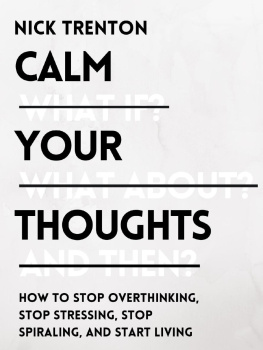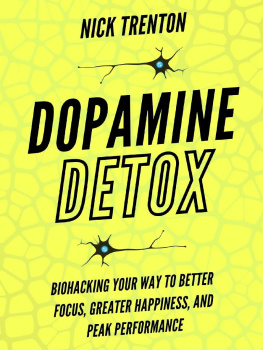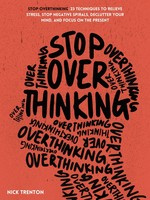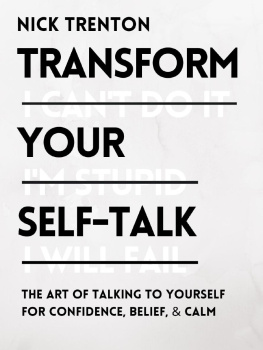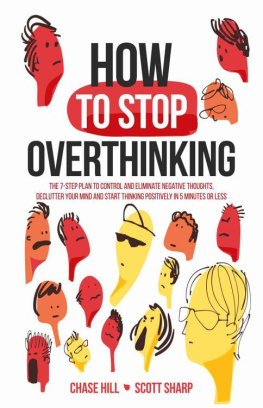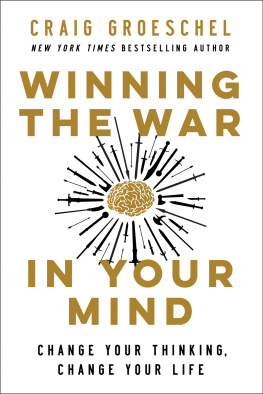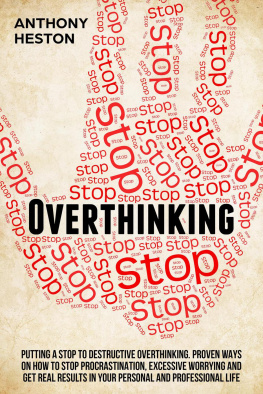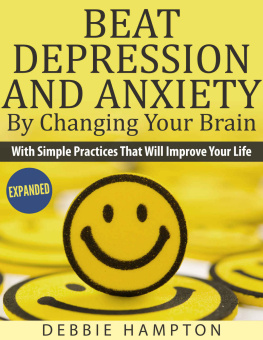Table of Contents
Calm Your Thoughts:
Stop Overthinking, Stop Stressing, Stop Spiraling, and Start Living
by Nick Trenton
www.NickTrenton.com

Pick up your FREE 22-PAGE MINIBOOK: The 4 Essential Elements of Emotional Well-being and Happiness
- Unconventional ways to instantly de-stress and become present
- Live with intention because you know your core values
- 3 methods to scientifically enhance your mood and more fulfilled
<< Just click right here to gain inner motivation and quiet your mental chatter. >>
Table of Contents
Why You Get Anxious
The Science Behind Your Brains Negative Bias
Its All About Control
Regulate Emotions
A Regulation Framework
The ABC loop
Emotional Dashboarding
Worry Postponement
Using the Five WHYS
Distress Tolerance
Detachment and Stoicism
The Value of Neutrality
Be Grateful and Savor Life
Three-Step Cognitive Behavioral Therapy
Step 1: Observe
Step 2: Challenge
Step 3: Replace
Attention Training
Meditation for Novices and Veterans
A Mindful Framework
Challenges and Obstacles with Mental Chatter
The Four As of Stress Management
Stress Diaries and Journals
The 5-4-3-2-1 Grounding Technique
Narrative Therapy and Externalization
A Word on Ruminating
Chapter 1. Introduction
With anxiety, life sometimes feels like a waking nightmare. Its like a veil of negativity is thrown over everything you think, feel, and do. Life can feel claustrophobic as more and more restrictions seem to interfere, making it hard to be spontaneous or relaxed. And the worst thing is you may not even understand why any of it is happening, nor can the people around you. It may seem like people explain away your anxiety as a bad attitude, to being oversensitive, or simply expect you to cheer up because theyve thoughtfully explained all the reasons why your fears dont make any logical sense.
But its never that simple, is it? In this book, were taking a closer look at what anxiety is, how it works, and how you can learn to live a life that feels good to you despite experiencing anxiety. Stressful overthinking can feel like a trap, like something you can never escape or fix. But you can! If youre ready to make a genuine change, to take care of yourself, and to take some powerful first steps toward a low-anxiety life, then this book is a great place to start.
First things first: anxiety is a legitimate psychological phenomenonyou are not wrong or stupid or crazy. And youre not a bad person just because you havent figured out how to free yourself from anxiety yet. I was diagnosed with GADGeneralized Anxiety Disorderwhen I was just eighteen, even though to be honest, the symptoms had been with me long before that. My life was ruled by FEAR. But today, I can honestly say that I have learned not to let anxiety control me, and one of the first steps to recovering was to let go of the habit of self-criticizing, self-blame, or feeling ashamed about how I was feeling.
Now, anxiety is not your fault, but it is your responsibility. What I mean is that I didnt choose to have anxietybut I could always choose to do what it took to get out of its clutches. When I realized that I did have control over my life and that I had a say in how my life played out, I felt empowered to be better. It was (still is!) a long, personal, and challenging journey. But I dont regret a thingexcept perhaps not believing in myself and starting sooner!
This book has been written for you if you have reached that point in your life where you feel like anxiety has you in its clutches and wont let go. Anxiety is strangewhile you desperately try to keep control, you feel more powerless than ever and at the mercy of strong negative emotions that never seem to switch off. Many of us have a particular picture of what anxiety looks like, but this picture is bigger than you may realize.
Anxiety can play out in our work lives, causing us to feel self-doubt, imposter syndrome, or burnout. It can interfere with our relationships, coming between us and the people we love. It can wait for us in the wings, ready to sabotage our efforts and undermine our dreams and goals. Its there in our family life, with our friends, when we look in the mirror. Anxiety is in our thoughts, but its also in how we feel and in every cell of our body. Its tight muscles, frazzled nerves, upset stomachs, sweaty palms, headaches, and allergies. Its lurking in our learned behaviors, every time we bite our nails, double check the front door, or turn down an invitation.
What Im saying is, I dont quite know what anxiety looks like for you personally. I may talk about rumination, regret, low self-esteem, bad lifestyle habits, and rotten thinking patterns. Some of these things may apply to you and some less so. The anxiety tree has many branches, but I hope that as you read, you can recognize its roots in your own situation, even if its not exactly the same as mine or the people I give as examples.
In this book, I want to teach you everything Ive learned, and all the tips, tricks, techniques, and methods Ive found to help you build self-compassion, upgrade thinking patterns, and take care of yourself, body and mind. The truth: it will take patience and stepping outside your comfort zone. But you can be a master of your lived experience, and you can absolutely discover joy and ease in your life again... I know you can because I did.
Like any change in life, it takes time and consistency. It takes courage. However deep the hole youre in, you can climb out one step at a time to live that full, rich, and fearless life you were always meant to be living. Lets dive in.
Why You Get Anxious
So, youve obviously asked yourself, why me? Why do I have to suffer anxiety?
The truth is that there is no single cause for anxiety, but many interrelated causes that all increase your risk or probability of experiencing overthinking, stress, and tension. Multiple causes can explain how some solutions (i.e. medication or CBT) work for some people, but not others. We all have our own predispositions, but we are also blessed, however, with protective factors and inner mental resources that help us push back against anxietywhen these inner resources are overwhelmed or depleted, thats when we have a hard time.
Well look at the root causes of anxiety in more detail later on, but for now, here are just a few of the things that could be causing you to ruminate, worry, or overanalyze. (Youll notice that none of them are reasons to beat yourself upremember, its not your fault!)
- A vicious cycle of learned behavior You know how it goes. You are anxious, and you feel bad about that. You avoid activities, which makes you feel worse, and develop anxiety about your anxiety... Anxiety is at heart a learned behavior and a coping mechanism (just not always the best one). But if you learned that behavior, then guess what? You can unlearn it.
- A stressful lifestyle A punishing work schedule, chaotic home life, or grinding financial pressures will take their toll. Are you a workaholic with insomnia and bad eating habits? Are you in bad relationships, abusing substances, or dealing with crisis after crisis? Its no surprise you have anxiety.
- Genes Yes, there is a hereditary component to anxiety. Having anxiety genes doesnt mean you will develop anxiety, only that you are more vulnerable to it. A tendency doesnt mean your fate is written in stone, though. What you inherit from your parents is a

